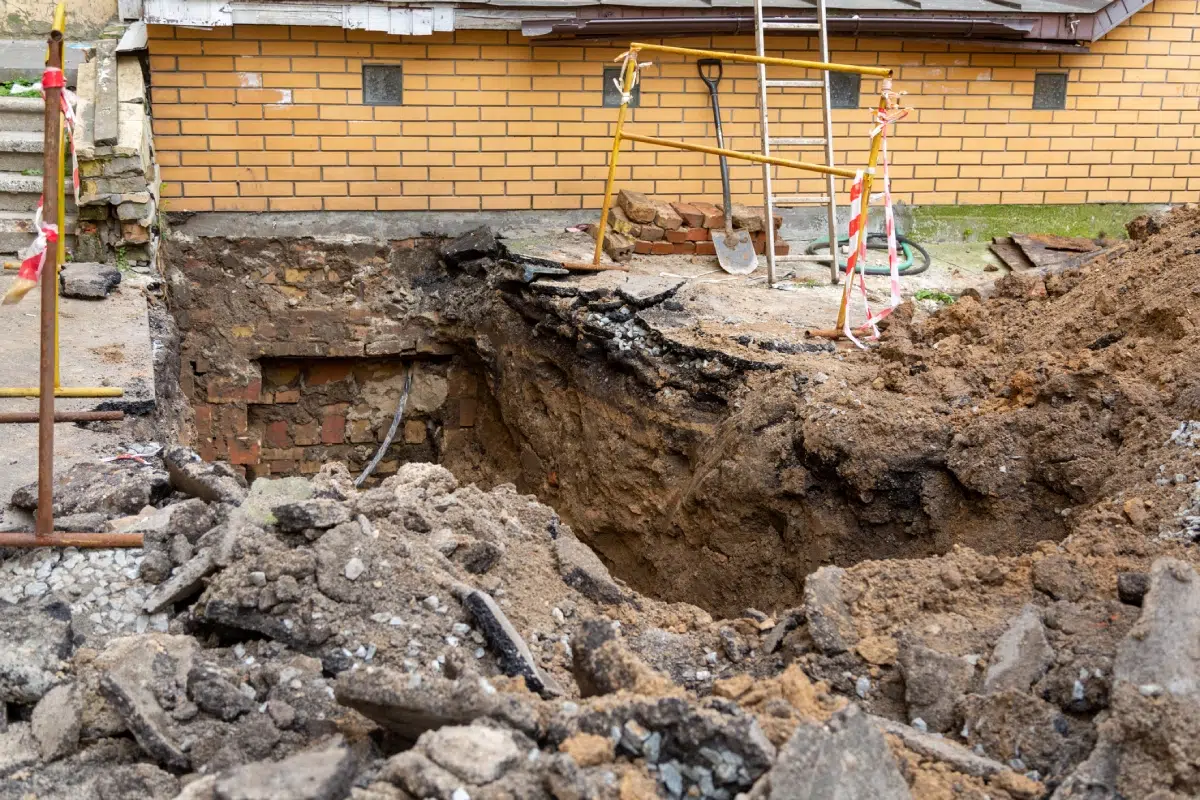
Sinkholes account for at least $300 million in damage each year in the U.S., and insurance companies are well aware of the risk of offering coverage for sinkhole-related losses. If you’ve already filed a sinkhole claim and received a payout, you might wonder whether you can buy coverage again.
Can you get sinkhole insurance after an insurance claim paid for a previous collapse? Sometimes, but it isn’t always easy. Learn whether carriers will write new sinkhole policies after a claim, what challenges you might face, and which options remain to keep your home protected.
What Is Sinkhole Insurance?
When you own property where the ground might suddenly give way, a standard homeowner’s insurance policy may leave you exposed. In this scenario, sinkhole insurance can protect you. Sinkhole insurance covers damage to structures and property when underground rock erodes and your foundation or walls crack or cave in.
Standard homeowner’s or commercial property insurance policies do not automatically cover losses due to earth movement, such as sinkholes.
In Florida, though, insurers are legally required to offer optional sinkhole coverage (for an additional premium) because sinkholes are a significant concern in the state. This means that if you purchase a property insurance policy from a Florida-licensed insurer, you can ask the company about adding sinkhole insurance coverage.
Types of Sinkhole Insurance Coverage
In Florida, there are two tiers of coverage related to sinkhole damage: catastrophic ground cover collapse (CGCC) and sinkhole loss coverage.
Catastrophic Ground Collapse Coverage
Florida statutes mandate that every property insurance policy must include coverage for catastrophic ground cover collapse. This is a very extreme sinkhole incident. All four of the following criteria must be met for an event to be deemed a catastrophic ground cover collapse:
- The ground suddenly caves in
- There is a visible depression on the surface
- The building’s structure (foundation or walls) suffers damage
- A government agency condemns the property and orders it to be evacuated
If an event meets all of those conditions, a standard commercial homeowner’s or insurance policy will cover the damage under CGCC provisions. Miss even one of these criteria, though, and CGCC doesn’t apply.
CGCC coverage is meant for truly disastrous collapses, such as when a home falls into a deep sinkhole. Suppose that your foundation cracks due to a sinkhole, but inspectors still deem the home safe. That damage falls outside CGCC coverage. This protection only kicks in when the collapse is severe enough to render your house uninhabitable.
Sinkhole Loss Coverage (Standard Sinkhole Insurance Endorsement)
To cover less-than-catastrophic sinkhole damage, Florida law lets you add sinkhole loss protection for an extra premium. This endorsement bridges the gap between minor cracks (which might not be covered) and a total collapse.
Importantly, while an insurance company must offer sinkhole coverage, it has the right to follow its own underwriting process. The company can require an inspection of the property before adding the endorsement and can refuse to issue sinkhole coverage if the inspection finds signs of active or unrepaired sinkhole activity.
In response to market issues, Florida passed a law in 2016 letting insurers offer pared-down sinkhole policies for homes with lower coverage caps so that more homeowners can get at least partial protection with more affordable premiums.
However, commercial real estate is excluded from this limited sinkhole coverage insurance law. It’s also noteworthy that Citizens Property Insurance Corporation (the state-backed insurer of last resort) is not permitted to offer these new limited sinkhole policies.
In practice, some private insurers may now offer a standalone limited sinkhole policy or a limited endorsement (covering, say, only a fraction of the home’s value) to help homeowners in risky areas obtain at least partial coverage.
What Is Covered Under Sinkhole Insurance?
A sinkhole insurance endorsement in Florida typically covers direct physical damage to the insured structure caused by sinkhole activity. Policyholders may be covered for the following types of losses.
Structural Repairs to the Building
If a verified sinkhole causes damage to your home or building, your sinkhole coverage will pay to repair those structural elements. Some examples include foundation cracks, walls pulling away, and floors slumping.
Stabilization of Land and Foundation
In many sinkhole cases, fixing the building requires stabilizing the ground beneath it to prevent further collapse. Sinkhole insurance generally pays for ground stabilization efforts like grouting (pumping concrete into cavities) to shore up the soil.
Personal Property
Your belongings, like furniture, appliances, and electronics, are covered only if a verified sinkhole causes structural damage. A simple yard collapse or minor cosmetic settling won’t trigger contents coverage. But once walls crack or floors buckle and the building itself needs repair, any personal items damaged by that event fall under your endorsement.
Additional Living Expenses
If a sinkhole makes your home uninhabitable, your policy’s loss-of-use coverage can kick in to pay for temporary housing and additional living expenses. This means that your insurer will pay for hotel bills, meals, and other reasonable costs while repairs are underway. Double-check your endorsement language to confirm whether your loss-of-use coverage applies to sinkhole incidents.
Evaluating the Need for Sinkhole Insurance
Whether a property owner should obtain sinkhole insurance depends on their location, local geological factors, and their risk tolerance, as well as market availability and the cost of premiums.
Florida is often regarded as ground zero for sinkhole risk in the United States, which spurs many local homeowners to maintain sinkhole insurance coverage. In fact, according to the U.S. Geological Survey, Florida leads the nation in sinkhole damage incidents.
This is likely due to the layers of limestone under Florida soil. Limestone is particularly prone to developing sinkholes.
Consider these factors before shopping for sinkhole coverage.
Signs of Sinkhole Vulnerability
Visible warning signs of sinkhole activity on your property are a cause for concern. These can include:
- Cracks in your foundation, walls, or floors
- Doors or windows that suddenly misalign
- Depressions or soft spots in the yard
- Cracks in the ground surface
Such signs could indicate underground voids and may foreshadow a sinkhole forming. If you observe these and an engineer confirms a sinkhole risk, having insurance coverage becomes very important. Since your insurance company might require an inspection before offering sinkhole coverage, these signs might be discovered during underwriting.
Market Availability and Cost
One practical consideration is whether you can afford sinkhole insurance. The cost for sinkhole coverage in Florida can be quite high. It may be an extra $2,000 to $4,000 per year on top of a standard homeowner’s insurance premium. High-risk counties often see the highest premiums.
Can You Get Sinkhole Insurance After a Claim?
Many Floridians who live in an area with a high risk of sinkholes are seeking the answer to this question: Can you get sinkhole insurance after an insurance claim paid for damage?
If your property has already experienced a sinkhole loss in the past and an insurance claim was paid out, it becomes more challenging to get sinkhole coverage afterward.
However, it may not be impossible. Your insurance company will want proof that the ground collapse was fixed the right way. That means providing an engineer’s report and contractor invoices showing that the soil was stabilized and that you had your foundation repaired.
For example, Citizens Property Insurance Corporation states that for properties that have had a sinkhole loss or claim, acceptable proof of repairs is required in order for the property to be eligible for coverage.
If you can’t provide sufficient documentation that the sinkhole was properly fixed according to engineering standards, Citizens may only offer a very limited policy or might deem the property ineligible for full coverage.
Private insurers, too, may require engineering reports that confirm the sinkhole stabilization was completed successfully before agreeing to write a new policy that includes sinkhole coverage.
Florida law also makes past sinkhole claims a public record. Sellers must tell buyers if a claim was paid and whether the funds were used to repair the damage.
When you apply for coverage, insurers will ask if your property has a sinkhole history. You have to answer truthfully. If you conceal a known sinkhole history, and the insurer later discovers it (they often will, via public records or inspections), it could be grounds for denying a subsequent claim or even voiding the policy for misrepresentation.
When repairs meet industry standards and come with a clean engineering sign-off, the property might become more feasible.
Some underwriters actually consider a properly repaired sinkhole property to be less risky, in some cases, than an unrepaired one or even a neighboring property that hasn’t been tested. The rationale is that the ground has been reinforced and analyzed by geotechnical experts, whereas a never-tested property might have unknown cavities.
If you haven’t fully fixed the damage, then obtaining new sinkhole coverage is very unlikely. No responsible insurance company will offer sinkhole loss coverage on a house that’s known to have an active, unrepaired sinkhole problem.
In fact, failing to repair a sinkhole after getting an insurance payout can have severe consequences. Besides risking insurance denial, you could face legal liabilities for misrepresenting the condition if you try to sell your property without disclosing what happened.
So can you get sinkhole insurance after an insurance claim paid for a previous event? In short, yes, you can get sinkhole insurance after a prior sinkhole claim, but only if you’ve responsibly addressed the issue.
Talk to a Florida Sinkhole Claims Lawyer
If your insurer downplays your damage or skips proper testing, a sinkhole attorney from Kennon Law can step in. Reach out to Kennon Law today for a free consultation and take the first step toward restoring your home.


